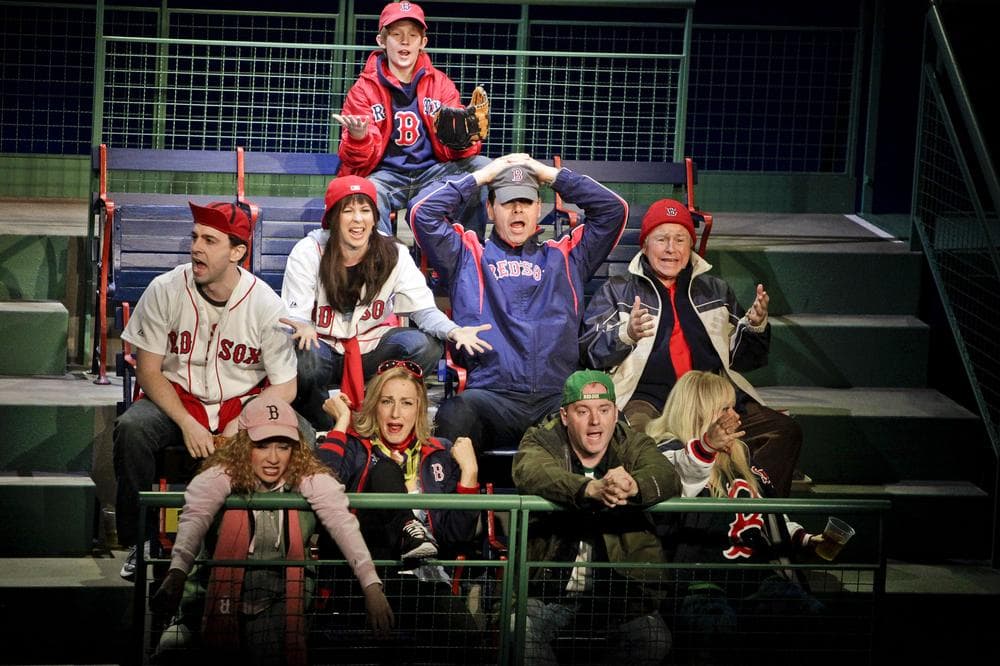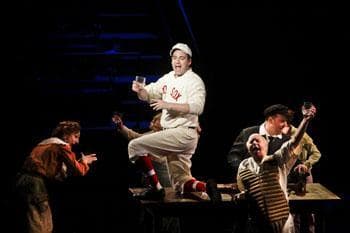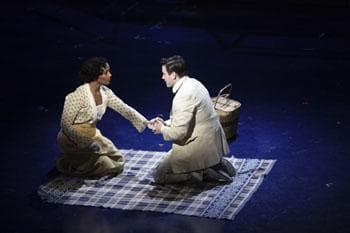Advertisement
New Musical Re-Imagines Bambino's Curse

If you've been a lifelong fan of the Red Sox — and your life started before 2004 — you've probably asked yourself this question: "Why does God hate us? What have we done?"
So it's a fitting first line for "Johnny Baseball," a musical about the Red Sox and the Curse that left the team without a World Series win for 86 years. The show makes its world premiere Wednesday night at the American Repertory Theater in Cambridge.
Never did the question seem so poignant in Red Sox Nation than in the fall of 2003, when it looked like Boston would beat the Yankees in the American League Championship Series and go on to the World Series. But they blew it. And in such dramatic fashion that a couple of playwright friends, Richard Dresser and Willie Reale, were inspired to turn it into theater.

"What’s great about the Sox and writing a musical about the Sox is that the tragedies were so compelling," Reale says. A Yankees fan, Reale had been at the game with five friends — all of them Sox fans. If he needed proof of tragedy, it was written on their faces as they rode the subway home that night.
"It was like a funeral," Reale remembers. "They were all kind of blinking back tears. I called Rick the next day and we talked about how powerful the emotions surrounding the Red Sox are and determined that this stuff can really sing. So we started talking about writing a musical."
Unlike Reale, Dresser is a Sox fan to the core. Meaning he's spent a lifetime rooting for the losing team — "I started going to games when the way you built enthusiasm was by banging the empty seats on either side of you," he says. "Which would cost you thousands of dollars now."
So in 2003, when the two started throwing around the idea of writing about the Red Sox, it never occurred to Dresser that the curse that might be broken before they finished. But of course it was, the very next year. Who can forget the call by WEEI-AM's Joe Castiglione?
Advertisement
Foulke to the set, the 1-0 pitch, here it is ... swing and a ground ball, stabbed by Foulke. He has it. He underhands to first. And the Boston Red Sox are the world champions. For the first time in 86 years, the Red Sox have won baseball's world championship. Can you believe it?
Dresser couldn't believe it. "Our first feeling was: there goes the musical," he says. "And then we realized that the Red Sox had in fact written a glorious end to our musical and then it kicked in for real and then we actually started working."

Flash forward six years and the result is "Johnny Baseball," the story of a small-town kid from Worcester whose big-league arm gets him signed by the Sox. It's also the story of the Curse — but not the story you usually hear. In this version, it has nothing to do with Boston trading Babe Ruth in 1919.
Instead, the curse is brought on by something much more sinister: racism.
"The Red Sox were the first team to try out an African-American ballplayer, Jackie Robinson in 1945," Dresser says, "and they were the last team in the major leagues to sign an African-American and that was in 1959 — 12 years after Jackie Robinson — Pumpsie Green."
In the play, the team's prejudice is shown through Johnny O'Brien's romance with Daisy Wyatt, an African-American lounge singer. Sox owner Harry Frazee is determined to keep the two apart, and sends some of his goons to have a chat with Daisy.
It's heavy subject matter. But it's also a lot of fun. Like when Johnny's local pep squad, the Worcester Boosters, tries their best to make catchy cheers out of Massachusetts' hard-to-pronounce town names (they may have found the only word in the English language that rhymes with Scituate).
“What’s great about the Sox, and writing a musical about the Sox, is that the tragedies were so compelling.”
--Willie Reale, playwrightDresser says that was the point: lure Sox fans into the theater, then hit them with a much deeper story.
But both he and Diane Paulus, the show's director, reject the idea that they're too hard on the franchise. "'Johnny Baseball' to me is a complete homage to the city of Boston and to the Red Sox and the love of baseball," Paulus says. "The show is really about shedding light on why the curse ended, as much as why there was a curse."
One thing is for sure. "Johnny Baseball" is a very Boston production. Which raises the question: Is it too Boston? It's hard to imagine the show having a life on, say, Broadway with a musical number that includes the "full" name of Bucky Dent, the Yankee famous for homering against the Sox to end their 1978 season (hint: reduced to a middle initial, his name would read "Bucky F. Dent").
When the ART questioned the writers about dropping the F-bomb during a family show, lyricist Reale had this answer: "There isn't a mother in Boston who would object to it."
There are probably a few mothers in New York who would. But ultimately, says everyone involved in this show, "Johnny Baseball" is about more than the Red Sox. It's everybody's game.
This program aired on June 2, 2010.